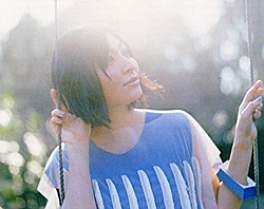After breaking free from Yoko Kanno over three years ago, Everywhere is Maaya Sakamoto's new compilation album that brings together fifteen years of vocal work including some of the most iconic theme tunes to some of the most influential anime and a variety of TV and radio shows.
With only one new track on the two CD release, for some it may seem a hard sell for tracks that are available on all of her other albums; however with such a stunning track list, it reads more like a "best of" than simply an anniversary collection. There is a definite split with the tracks: many of them having been featured as anime, TV and radio themes whereas the others are simply memorable or notable works from her six full albums, two single collections and two "concept" albums. The media tie-ins intrinsically link the songs to an emotional theme that echoes the productions they were attached to; they also represent touchstones in the timeline from Maaya's entrance as Hitomi in the Vision of Escaflowne to both the musical and vocal powerhouse she is now. On the other hand, the original tracks anchor the collection to her previous releases and remain more personal to listeners, tied to whatever event or period within their life when they first experienced them.
RahXephon also makes a strong showing with both the TV series opening ヘミソフィア (Hemisphere) and tune the rainbow on the first disc. Hemisphere shares many of the same properties as Promises not needed with Yoko Kanno's trademark flare for memorable and expansive openings mixing classical instruments and synthetic sounds; blended with Maaya's singing, the entire track has a wonderful pulse to it that builds and releases to excellent effect. Tune the rainbow on the other hand is more vocal led and although there is some odd augmentation of her voice, it still shows a richer timbre than her comparably squeaky earlier works. Both fit the RahXephon series perfectly with the TV series' focus on time and the movie, for which tune the rainbow sees out, enjoying a greater focus on Kamina and Haruka's relationship.
Other anime series make appearances as well with マメシバ (Mameshiba), the opening to the relatively unknown Earth Girl Arjuna. Featuring a bold string opening leading into the voluminous six minute track which blends slightly too many styles to be entirely memorable - Maaya's singing is still front and centre but at times the composition can feel oppressive, never letting either the music or the vocals breathe. Gravity is a different beast entirely: no longer is there musical momentum driving it, instead replaced with a subdued piano and a slower, more melancholy beat. Used as the ending to the Wolf's Rain series and sung entirely in English, there is some occlusion of words with a forced harmony half-way through but otherwise this demonstrates Maaya is just as capable with the measured and emotional tracks as she is with the faster, more sonically challenging ones.
Tsubasa Chronicle's ending song, ループ (Loop), rounds out the first disc with a remix subtitled "sunset side". As one of only two tracks on the first disc without Yoko Kanno providing the music, the change is pronounced with a far less tonally rich accompaniment. The change from the original track removes much of the harshness that came from the backing drum beat and reliance on electric guitars, resulting in a gentler, more welcoming song, but still suffering from lack of memorability. A little under midway through the first disc is the wildly different Record of Lodoss War opening theme, 奇跡の海 (Sea of Miracles), which opens with deep, tribal chants followed by a rich and spacious mixture of low frequency drums; Yoko Kanno's influences for her later work on the Macross Zero OVA more than apparent.
The final anime related tracks include another remix, this time of マジックナンバー (Magic Number), used as the opening for the recently completed Kobato series and the similar プラチナ (Platinum) and Gift; the former the third opening for Card Captor Sakura and the latter the ending to Clamp School Detectives which aired shortly after Escalfowne. Both pitch themselves with a twee innocence and boundlessly happy melodies replete with the odd snippet of English mixed into the lyrics. They're perfectly aimed at the child friendly series and effortlessly evoke the technicolour pastels and life affirming stories that characterise them.
The majority of the other tracks are originals featured either as TV or radio themes or previously on her albums. Some tracks stand out above the rest and include ダニエル (Daniel) and 30minutes night flight. Daniel was the insert song to the radio drama The Other Side of Midnight and, like Gravity, demonstrates a more sombre and contemplative side to an artist known more for upbeat productions; the superb English lyrics, simple backing melody and acoustic feeling all combine to make this a stunning and very moving song. 30minutes night flight was always going to be a gamble, Yunagi Loop tried to capture a lot of the Yoko Kanno spirit in the tone and delivery of the different tracks; 30minutes night flight however moved in a different direction musically and, thankfully, is all the better for it. Now self-contained after the EP version which bled into the second track, the beat is the most prevalent aspect of the song but only serves to bolster the sparse, vibrant vocals.
Tellingly, the only release from her previous full album, Kazeyomi (Wind Reader), is the forgettable カザミドリ (Weather vane) which despite all of the right components lacks coherence. Maaya's other album releases are well represented, including the opening track I.D. which performed similar duties on her second album Dive, the plain vocals and piano chords make it recognisable and a fitting opening but far from the easiest to listen to. The remaining tracks collect together many songs which, while individually aren't the most memorable or accomplished, contribute to the easy listening texture that Maaya manages regardless of her musical accompaniment: blind summer fish, Remedy, ユッカ (Yucca) and Feel Myself all have a buoyant and cheery disposition that is easy to get lost in and superb to relax and unwind to.
The final track on the second CD is the brand new release, Everywhere. Although familiarity is high, the inclusion of the harmonised backing vocals and higher pitched instrumentals give it a complex overall sound. It rejects a faster tempo for a more floaty and ethereal feeling, gently lilting into and out of consciousness. Certainly a different offering than previous singles which included Triangler and 雨が降る (Falling Rain) although coming immediately after マジックナンバー (Magic Number) gives it some context.
It would be impossible to include every great track that Maaya has ever released or produced, however this is by far her strongest compilation since the absurdly brilliant Nikopachi which includes a number of the same tracks. The mix of productions for both other media and her own releases is fantastic and demonstrates not only the range Maaya is capable of but the progression from her earliest works right through to the recent entries with Kazeyomi and Macross Frontier's Traingler as well as her still prolific voice acting potential, with roles such as Shiki from Kara no Kyoukai and Nino in Arakawa Under the Bridge. Still only thirty years old she has achieved an immense amount since her debut and in that vein, Eveywhere is the perfect summary of her work so far and is the most accessible way to catch up to a career that, with any luck, will long continue.







Kazeyomi is unfortunately her weakest album to date and hasn't been in my rotation for quite a while, some of her anime OP/ED songs are good but they all lack the zest of earlier tracks which Everywhere collates together.
And your help was in providing brilliant reviews of both Kalafina albums which let me know it was possible to review an album without sounding at all pretentious which is what many early drafts of this post came across as. And of course suggesting the Jaffa cakes! They accompany all my difficult posts now.